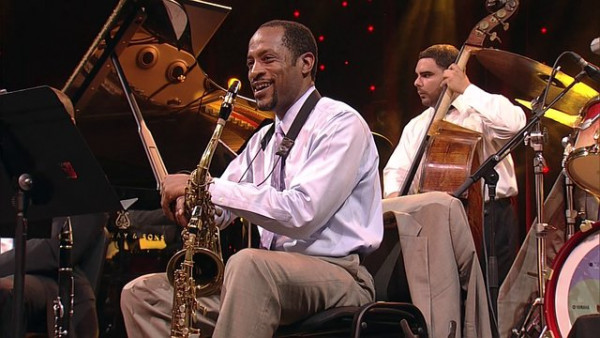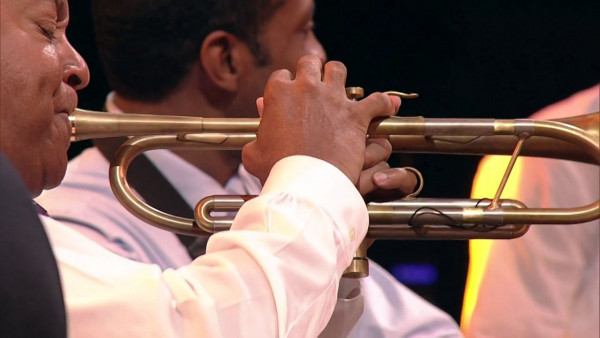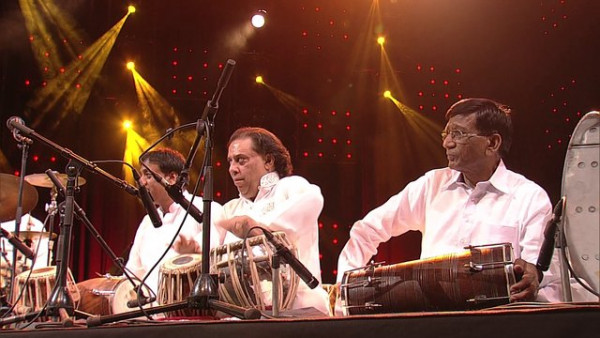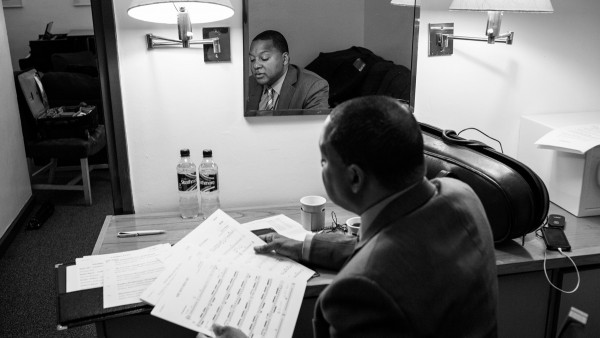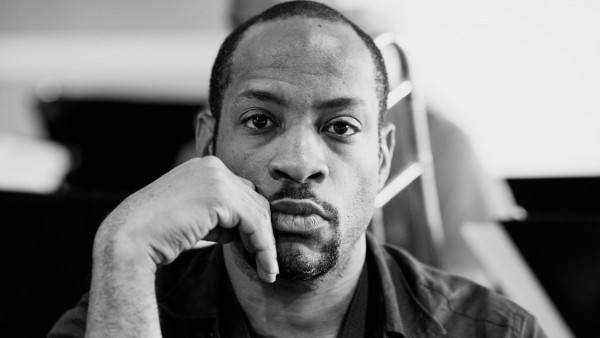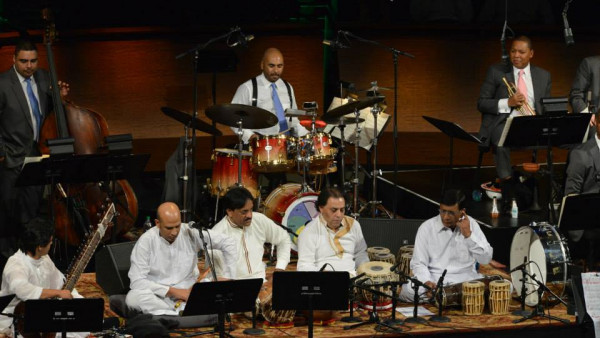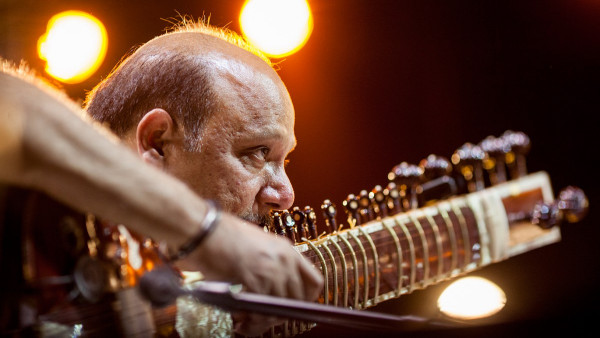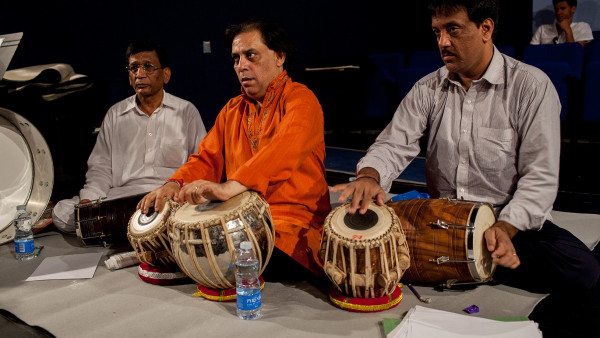Wynton collaborates with The Sachal Ensemble on “Song of Lahore”
Universal Music Classics presents an East-meets-West musical landmark: Song of Lahore, an album inspired by the moving documentary of the same name by two-time Academy Award-winning director Sharmeen Obaid-Chinoy (Pakistan’s only double Oscar winner). In this unprecedented cross-cultural, genre-bending collaboration, the soulful musicians of that film – The Sachal Ensemble of Pakistan – perform iconic songs of understanding and hope alongside stars from across jazz, rock, R&B and Americana, all convened by Grammy Award-winning producer Eli Wolf (Norah Jones, Robert Glasper). “You hear the term ’world music’ thrown around a lot,” Wolf says, “but this album is truly music of the world, with songs and artists from New Orleans, Kentucky, New York, Philadelphia, Los Angeles, the U.K., Jamaica, Brazil, Greece, Pakistan and more all brought together to create something beautiful.” The Sachal Ensemble’s Nijaat Ali adds: “God willing, this will help the entire world will see that Pakistanis are artists, not terrorists.”
The musicians of The Sachal Ensemble come from the Pakistani city of Lahore, for hundreds of years a thriving center of the arts on the Indian subcontinent. By the 1960s and ’70s, Lahore was the home of “Lollywood,” the Pakistani equivalent of India’s Bollywood film production center, employing many musicians who were virtuosos on their instruments and had developed a distinctive sound and sensibility. But in 1977, with the establishment of a conservative Islamic regime and Shariah law in Pakistan, music was outlawed as “a sin against God.” Esteemed musicians were soon out of work, having to hide their instruments away to take jobs in coffee shops or driving rickshaws. The members of The Sachal Ensemble literally risked their lives to continue making music — their life’s passion.
To be released by UMC on May 20, 2016, Song of Lahore sees The Sachal Ensemble reunited with Wynton Marsalis, with whom the group collaborated triumphantly in the film along with the superstar trumpeter’s Jazz at Lincoln Center Orchestra. Marsalis solos on their re-imagined version of “Blue Pepper (Far East of the Blues),” from Duke Ellington’s LP Far East Suite. Bohemian chanteuse Madeleine Peyroux sings on a deeply affecting “mash-up” of the African-American spiritual “Sometimes I Feel Like a Motherless Child” with Pakistani hymn “Mai Ni,” while New York-via-Tokyo duo Ciba Matto puts a new urban spin on Bob Marley & Peter Tosh’s “Get Up, Stand Up.”
Other artists joining The Sachal Ensemble on Song of Lahore: North Carolina-bred, Brooklyn-based folk-jazz singer Becca Stevens (Michael Jackson’s “Man in the Mirror”); the down-home blues-rock team of singer Susan Tedeschi & guitarist Derek Trucks (Bob Dylan’s “Shelter From the Storm”); Jim James of Kentucky rock band My Morning Jacket (Stevie Wonder’s “Love’s in Need of Love Today”); guitarist Nels Cline of avant-Americana favorites Wilco (Pakistani folk song “Laila Lo Laila”); Sean Lennon (Nick Lowe/Elvis Costello’s “(What’s So Funny ’Bout) Peace, Love & Understanding”); recent Grammy winner/Kendrick Lamar collaborator Bilal (Allen Toussaint’s “Yes, We Can”); Marisol “La Marisoul” Hernandez of Mexican-American band La Santa Cecilia (for “I Wish I Knew How It Would Feel To Be Free,” made famous by Nina Simone); and Brazil’s Seu Jorge (on George Harrison’s “Give Me Love (Give Me Peace on Earth)”). Multiple Academy Award-winning actress Meryl Streep reads verses by Pakistani poet laureate Faiz Ahmed Faiz over an atmospheric groove.
Overcoming barriers of language and culture, six core members of The Sachal Ensemble teamed in tracking Song of Lahore with a sympathetic crew of New York session players led by multi-instrumentalist/arranger Michael Leonhart (Mark Ronson, Donald Fagen). In an example of the studio communion, Brian Wolfe – the drummer who plays with the likes of Sharon Jones & the Dap Kings – bonded with Sachal’s tabla ace, Ballu Khan, the two able to communicate wordlessly through their own unique, yet complementary, polyrhythmic virtuosity. To Marsalis, the shared purpose among the Pakistani and Western artists underscores “the leadership that musicians can take in demonstrating the fundamental humanity and commonality that we all share.”
The Sachal Ensemble had become a YouTube sensation through the group’s earlier re-creations of such tunes as Dave Brubeck’s “Take Five.” Sachal’s Baqir Abbas, a master of the wooden bansuri flute and one of the expressive stars of the Song of Lahore documentary, enlivens the group’s performances with his handmade instrument’s melodic arabesques. But back home, Abbas has to practice in a soundproofed room, because musicians are considered being of a lower caste in modern Pakistan. Of the conservative Islamists there who judge musicians harshly, he says: “They find God in… whatever their beliefs are. We find God in music.”
About the sound of The Sachal Ensemble, Leonhart says: “As soon as we were in the studio, we could tell that this feel the key Sachal guys have – Baqir the flautist, Ballu the tabla player, Asad Ali the guitarist – is just pure soul music. It’s like Stax or Motown. There’s something about the natural syncopation that Pakistani music has – it’s a kind of life-affirming swing.”
For Song of Lahore, musicians from across expanses of geography and culture joined together to express a collaborative message of peace in the face of a fractious world. “The album mirrors the meta-message of the documentary – which is that music is the universal language, a bridge across divides,” Wolf says. “When you look at the songs we chose – like ‘(What’s So Funny ’Bout) Peace, Love & Understanding,’ ‘Yes, We Can’ or ‘Give Me Love (Give Me Peace on Earth)’ – they express this universal ideal of hope and humanity, something that’s both timely and timeless.”
More info on: Universal Music Classic

